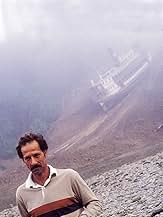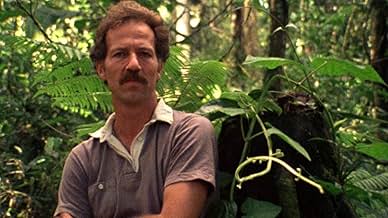Segue o autor alemão Werner Herzog enquanto ele lida com atores difíceis, mau tempo e conseguir subir um barco sobre uma montanha, tudo em um esforço para fazer seu filme Fitzcarraldo.Segue o autor alemão Werner Herzog enquanto ele lida com atores difíceis, mau tempo e conseguir subir um barco sobre uma montanha, tudo em um esforço para fazer seu filme Fitzcarraldo.Segue o autor alemão Werner Herzog enquanto ele lida com atores difíceis, mau tempo e conseguir subir um barco sobre uma montanha, tudo em um esforço para fazer seu filme Fitzcarraldo.
- Ganhou 1 prêmio BAFTA
- 4 vitórias e 1 indicação no total
- Self
- (as Alfredo de Rio Tambo)
- Self
- (as Angela Reine)
- Self
- (as Elia de Rio Ene)
- Self
- (as David Perez Espinosa)
- Self
- (as Miguel Angel Fuentes)
- Self
- (as Father Mariano Gagnon)
- Self
- (as Huerequeque Bohoroquez)
Enredo
Você sabia?
- CuriosidadesThroughout production, Les Blank and his small crew became exhausted and exasperated from the stress of the work. Blank said that he felt "unconnected" to the people around him. Keeping up with the antics of Werner Herzog and Klaus Kinski proved difficult for the reserved, introverted Blank. By the last week of production, he was so burnt out that he feared coming out of production "like some Viet Nam veterans, horribly calloused". He wrote in his journal, "I'm tired of it all and I couldn't care less if they move the stupid ship - or finish the fucking film".
- Citações
Werner Herzog: [On the jungle] Kinski always says it's full of erotic elements. I don't see it so much erotic. I see it more full of obscenity. It's just - Nature here is vile and base. I wouldn't see anything erotical here. I would see fornication and asphyxiation and choking and fighting for survival and... growing and... just rotting away. Of course, there's a lot of misery. But it is the same misery that is all around us. The trees here are in misery, and the birds are in misery. I don't think they - they sing. They just screech in pain. It's an unfinished country. It's still prehistorical. The only thing that is lacking is - is the dinosaurs here. It's like a curse weighing on an entire landscape. And whoever... goes too deep into this has his share of this curse. So we are cursed with what we are doing here. It's a land that God, if he exists has - has created in anger. It's the only land where - where creation is unfinished yet. Taking a close look at - at what's around us there - there is some sort of a harmony. It is the harmony of... overwhelming and collective murder. And we in comparison to the articulate vileness and baseness and obscenity of all this jungle - Uh, we in comparison to that enormous articulation - we only sound and look like badly pronounced and half-finished sentences out of a stupid suburban... novel... a cheap novel. We have to become humble in front of this overwhelming misery and overwhelming fornication... overwhelming growth and overwhelming lack of order. Even the - the stars up here in the - in the sky look like a mess. There is no harmony in the universe. We have to get acquainted to this idea that there is no real harmony as we have conceived it. But when I say this, I say this all full of admiration for the jungle. It is not that I hate it, I love it. I love it very much. But I love it against my better judgment.
We are guided by Herzog and a female voice over that tell us the unfortunate series of events that surrounded the filming of "Fitzcarraldo" during four years in Peru (I was disappointed by the fact they didn't show what happened in Brazil, where they filmed some scenes too but I guess the major problem was in Peru). From possible attacks of Indians who disliked the film's production in their territory to the point of threatening the crew, then moving to another location; the day-by-day of shooting in complicated locations and with many different cultures; the forced departure of two of the main actors (Jason Robards and Mick Jagger) which caused a delay in production since they had to film all over again; an aerial accident that left some serious victims (this wasn't well explained) these and more are among the several problems encountered by everybody involved in "Fitzcarraldo".
But the problem that gets honorable mention is the one that concerns putting a 300 ton steamship over a hill, pushed by a bulldozer. That was really complicated to make, people got injured with that and after failing in the first attempt, the movie was delayed for one year until they finally made it right. And also sailing with the same boat over rapids that damaged parts of it and injured members of the crew as well. Here's a dream that almost became a nightmare and a heavy burden to carry...literally! Just reading my words in here is not enough, you gotta see with your own eyes how painful and exhaustive was to shoot "Fitzcarraldo". But when you see Herzog's film you are rewarded with one of the most beautiful and poetic masterpieces of all time. And to think that he said that after that film he would never direct any film again...but he went on and made many other works.
Now the criticism: the difference between these documentaries lies in the fact that the one related with Coppola's film was something with beginning, middle and ending, very well structured which is something that this film failed at some parts, and the reason why this happened is simply because the director didn't wait one essential advantage that "Apocalypse Now" had: the test of time if a work will be relevant in the years that passed and in years to come. When the movie ends we keep asking ourselves if it worth all the while to go through enormous difficulties. They couldn't say if the movie was well received by public, the money spent vs. the money earned, those things. "Burden" was released practically simultaneously with "Fitzcarraldo"; "Hearts of Darkness" was released 11 years later, so that they could look back and have some proud over their work. The language barrier wasn't respected in terms of presenting everything to viewers, at least in the version I watched, where German, Spanish, Portuguese and other dialects are spoken throughout the film but there's no caption to translate what people are saying.
I liked the insights made by Herzog about the jungle, and about taking chances in order to make dreams into reality means to him. Everything is well presented, the fascinating behind the scenes of "Fitzcarraldo" was very cool to watch but more interviews with actors should be included (the one with José Lewgoy is the most interesting when he tells about acting makes him feel an complete person, and the instruction he gets of Herzog in how to act in a certain scene). And "Burden of Dreams" is not only about problems, it's about not giving up of a dream even if takes forever to be made real, fighting the most dangerous adversities. Sounds like an Hollywood film but that was very real just like the real Fitzcarraldo at one time placed a steamboat over a hill. Only after seeing this you'll understand the power "Fitzcarraldo" has over its viewers. 10/10
- Rodrigo_Amaro
- 9 de jul. de 2011
- Link permanente
Principais escolhas
- How long is Burden of Dreams?Fornecido pela Alexa
Detalhes
- Data de lançamento
- Países de origem
- Idiomas
- Também conhecido como
- Pelicula o muerte
- Locações de filme
- Empresas de produção
- Consulte mais créditos da empresa na IMDbPro
Contribua para esta página






























